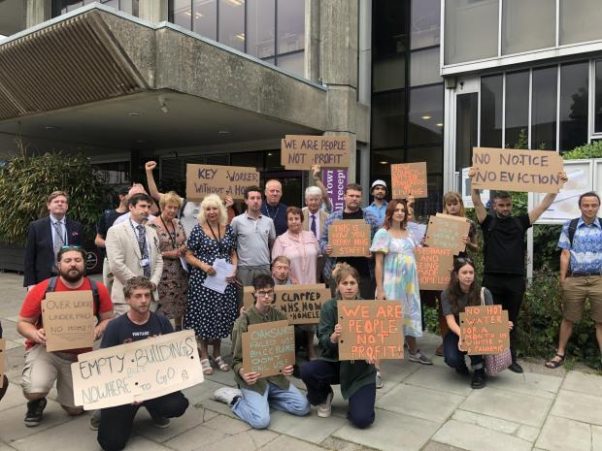Guardian companies continue to try to push back against the RRO legislation which forces them to license their properties and provide safe accommodation for their occupants (we would say tenants, but that’s for another story!). In our recent blog on the Global Guardians case, the Court of Appeal gave short shrift to similar efforts. Here is another decision, by Southern FtT, where the shrift was rather longer albeit with a similar result.

This is a case where guardians had been treated appallingly by both R, Oaksure Property Protection Ltd. (Oaksure), and Brighton & Hove Council (Brighton), who owned the building: they were given very short notice to pack up and leave their homes following an inspection in August 2022 by East Sussex Fire and Rescue Service in Brighton who found a number of life-threatening hazards. The guardians had had a reprieve from an earlier eviction notice in June, and another in July. See local reports here, here & here. The Fire Service had commented:
“We had given Oaksure repeated opportunities to resolve the fire risk so that their live-in guardians were safe. But the situation had become so serious that we had no option but to prioritise safety over income.” (Ed: Income? Surely homelessness?!).
There was some overlap with the Court of Appeal (CA) cases, particularly on the ground that guardians did not only use the property for residential purposes: this ground was added much later in proceedings by Oaksure, presumably after hearing about Global’s appeal on this ground.
The original grounds centred on the idea that the property was owned by Brighton & Hove Council, that they were managing the property and therefore, as a public body, were exempt from the licensing requirements under Schedule 14 of The Housing Act 2004 (HA).
Again we come to the 2 main conditions for a person to be a Respondent to a RRO application, i.e. that they must be either:
As defined in s263 of HA.
To be a person managing, you have to be an owner or a tenant (a leaseholder). If Brighton had granted Oaksure a lease, then Oaksure would be a person managing and so liable for a RRO. The decision therefore correctly spent considerable effort (& word count) considering whether Oaksure was a tenant by analysing both the agreement between Brighton and Oaksure and the circumstances of the arrangements “on the ground”, concluding that Oaksure had indeed been granted a lease.
Missing from this discussion, but recognised in other decisions on this matter, is the glaring reality that the last thing a council wants to do is become a landlord of guardians in their property, thereby entailing a duty to re-house them when their occupation ends. Judge Latham identified this clearly in Kaszowska & ORS v White (2021 LON/00AH/HMK/2020/0021) at §64:
“We have found that Croydon granted Camelot an interest in land (see [44] above). We are thus satisfied that Camelot was under a duty to licence the Property. It would have been open to Croydon not to grant such an interest, but rather to utilise Camelot as its managing agent. In such circumstances, there would have been a direct contractual relationship between Croydon, as principal, and the guardians. Our understanding is that this is just the type of relationship that Croydon has sought to avoid.” (Our emphasis).
It follows that no council would normally willingly enter into an agreement that made them a landlord of the tenants, so that R’s premise in this case was always unlikely.
Following the conclusion that Oaksure held a lease, most other matters fell into place for the guardians’ case. Southern FtT adopted the Upper Tribunal’s (Lands Chamber) (UT) position regarding use: it was purely residential, again assisted by s260 of HA which puts R to task to prove the contrary and for which no attempt had been made here. There was no need to establish that R was in control following the finding that they had a lease and were managing: R’s counsel gracefully conceded that R was in control, as well, anyway.
Originally, R had requested that this case should ‘leapfrog’ the FtT and go straight to the UT so that it was always on the cards to be appealed by them should they be found liable for a RRO. In the end the FtT decided to make a preliminary decision on the legal principles only and make no finding on the amount of any RRO. We must now wait to see whether R will indeed appeal: if not, a further hearing will be listed at Southern FtT for submissions regarding quantum of any RRO, should one be made. An appeal would no doubt involve a cross-appeal on a number of other issues by As, touched on in this decision and relevant to quantum, particularly whether guardians should be regarded as tenants rather than licensees…